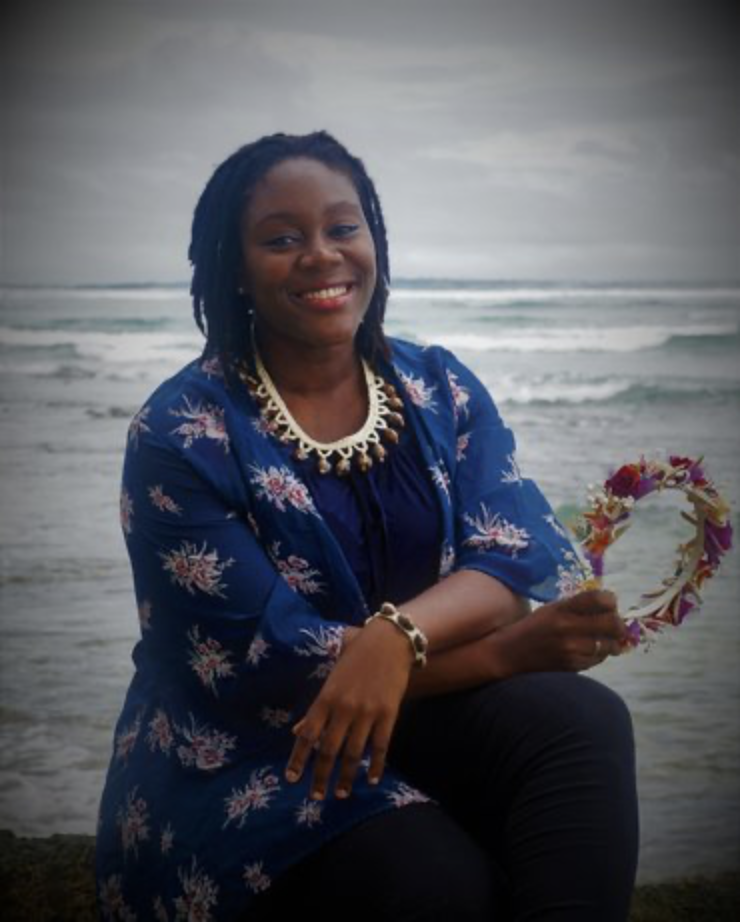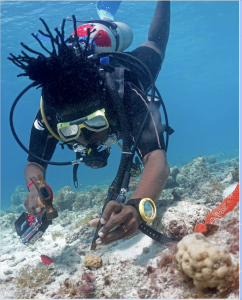We are looking back on some of our MSc graduates who have excelled in scientific research, ecology and conservation around the world since studying with us.
Today we meet Diana who graduated from MSc Conservation and Biodiversity in 2011 and is now a PhD Candidate at the University of Aruba, studying the Population Structure and Genetic Connectivity of Scleractinian Corals in the Southern Caribbean.
 Hi Diana, it’s been almost 10 years since you studied with us, why don’t you tell us a bit about your career in that time that led you to where you are now?
Hi Diana, it’s been almost 10 years since you studied with us, why don’t you tell us a bit about your career in that time that led you to where you are now?
Since graduating, I have lived and worked in several small islands. After graduating from the University of Exeter, I returned to the Caribbean and immediately got hired as a consultant for a Climate Change Management NGO out of Barbados. Later on, I moved to Majuro in the Republic of the Marshall Islands where I taught Marine Science at the College of the Marshall Islands. Although I loved living and working in the RMI, the opportunity of a PhD presented itself and I moved back to the Caribbean, this time, to Aruba. I am now a PhD candidate there and my research deals with examining the population structure and genetic connectivity of Scleractinian corals in the Southern Caribbean.
What made you choose to study your MSc with us at the University of Exeter Cornwall Campus?
Being from the Caribbean, I was familiar with issues surrounding Conservation and Biodiversity in my region. Therefore, it was important for me to broaden my knowledge of international aspects of the discipline so that I could develop wider perspectives on the issues and understand the applicability of the solutions to similar issues in my region and other small islands. I chose this University since it is well- known to be one of the best Universities in the world to deliver Environmental, Conservation and Wildlife Management programmes.
What do you think makes the University of Exeter, Penryn Campus such a special place to study?
The campus itself is very green and beautiful, and hosted a small but diverse student population, all of which suited me personally. It was inspiring for my own work, to be surrounded by nature in a peaceful environment. The multidisciplinary way in which the courses were taught helped me to achieve an all-encompassing understanding of the discipline. There are several scholarship opportunities that are afforded to students from other backgrounds like myself and outside of the UK. I was awarded a full-tuition scholarship for Latin American/Caribbean students from the University to pursue this Masters’ programme. Had that not been the case, I doubt I would have been able to attest to the excellence and quality that is a degree from this institution!

We are glad you enjoy it as much as we do, what are your highlights from studying at the University of Exeter?
Living in Cornwall was wonderful. I lived on the campus dorms which was convenient, comfortable and well maintained. Relationships were built between students at every level, in fact, three of my closest friends to date were Bachelor students at the time and in very different disciplines from mine. The wider community was quite welcoming and there were pubs, restaurants and shops that I would visit from time to time when I needed a break from studying. The sea is also relatively nearby, which was a bonus, since, as an island girl, I absolutely love the water.
The field trips, especially the Kenya field trip were truly amazing. It remains one of my fondest memories to date. For my research project I ended up working on an area of research that initially had very little interest to me, and as such, presented a steep learning curve. I now am pursuing a PhD in that very aspect of the discipline, so I guess my Masters’ research project was definitely a game-changer! At the time my research project was entirely laboratory-based, and being able to work at lab facilities that were state-of-the-art and multi-faceted was a worthwhile experience.
Why did you choose a career in Scientific research?
I remember what the coral reefs on my island looked like when I swam over them as a child, and I am too aware of their downward transition over the course of my lifetime alone. The degradation of nature hurts me, especially since as a small islander our lives and livelihoods are closely intertwined with her. I chose this career so that as a scientist , I can contribute to the advocacy for environmental protection through my research. This field is also one of new discoveries and findings that are actually applicable in our coexistence with nature and I enjoy the opportunities for continued growth and learning.
 How do you think the MSc helped to prepare you for your career?
How do you think the MSc helped to prepare you for your career?
Aside from the academic skills and knowledge that I obtained while studying for this degree, I also gained skills such as critical thinking, organisational skills, and independence while conducting research. Prior to my experiences at the University of Exeter, I was mainly field-oriented ,so the fact that my Masters’ research was strictly lab-oriented ,my laboratory and even my computational skills as it pertained to statistical analyses became greatly enhanced. All of these skills certainly prepared me for current role as a PhD candidate in the Ecological and Evolutionary Sciences. In this role, my skills as a presenter, public speaker, and as a teacher are crucial as a contributor to the ongoing academic conversation in my field, and I credit my experience in the Masters’ programme for preparing me accordingly.
Finally, do you have any advice for those looking to pursue something similar?
A career in Biodiversity Conservation? is not an easy road. There are as many disappointments as there are successes in the field and sometimes the disappointments can be so daunting. However, let your passion for nature cause you to persevere. Be open minded and absorb all the knowledge your very worthy lectures will offer you. Read, a lot! From scientific journals in your field and related to it, to the news and contemporary literature by leaders in the field. I would say to current students embarking on a similar career that they are truly the hope for the future the world needs.
Thank you Diana!
If you want to read more profiles from MSc Biodiversity & Conservation graduates follow this link or explore our Graduate in Focus homepage to learn more about the degree programmes we have on offer!

